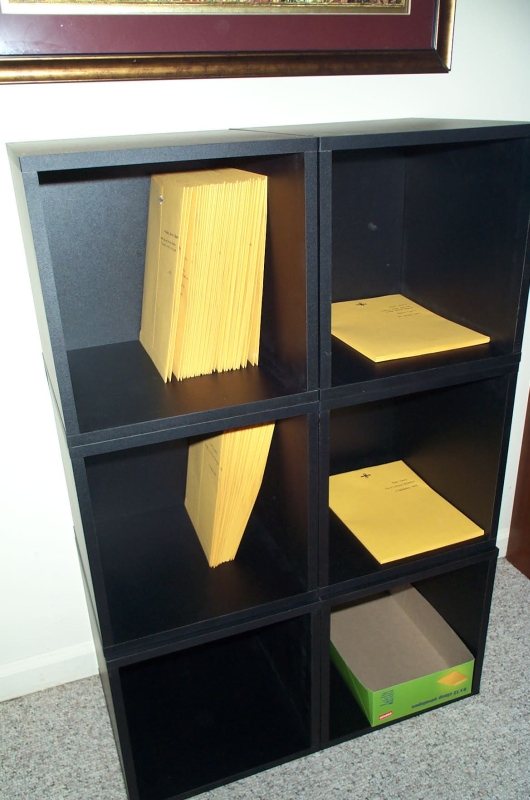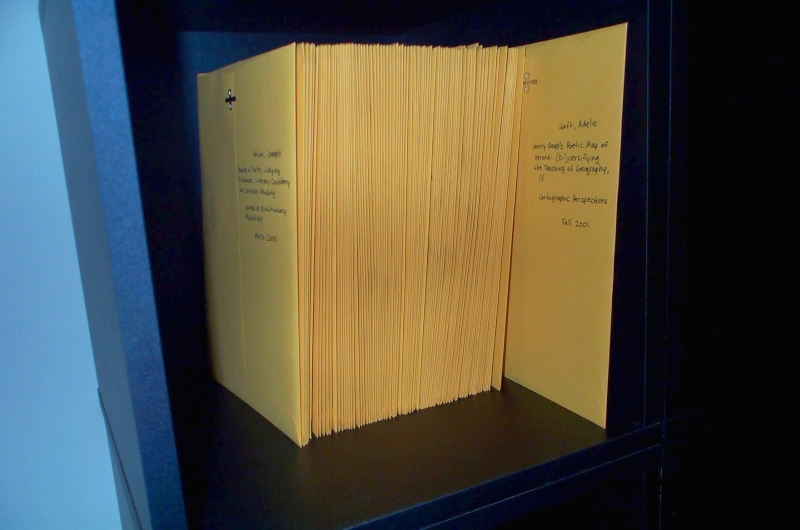I dipped into the box containing Reed's essays and poems copied from periodicals, but progressed only as far as titles beginning with "D", before my initial burst of enthusiam wore down. Labeling and stuffing one hundred envelopes at a stretch seems to be about the limit of my endurance.
One of the chapters in Altick's The Scholar Adventurers is "The Destructive Elements": describing the losses of many great works of literature, collections of personal letters, and irreplacable manuscripts to "fire, vermin, damp, and neglect." The passages describing the destruction of Sir Robert Cotton's collection of Anglo-Saxon literature is terrifying, and makes me wish I had purchased some sort of fireproof shelving, lest my paltry collection meet the same fate:
In 1700 the Cottonian Library was deeded to the nation; and after it was decided that Cotton House was too damp and ruinous for the preservation of the manuscripts the collection was transferred to Ashburnham House, which, besides being dryer and more spacious, was thought to be "much more safe from fire." Two years passed; then, early in the morning of of October 23, 1731, the city of Westminster was aroused by the alarm of fire at Ashburnham House. The first men on the scene saw the flames burning brightly inside the room where Cotton's fourteen book presses stood. Among the crowd which gathered were trustees of the collection, who broke into the burning house, ran to the presses, and feverishly threw hundreds of volumes from the windows. Among these rescuers was Richard Bentley, the Cottonian librarian and the greatest classical scholar of his time, who is reported to have raced from the flaming house "in his dressing gown, a flowing wig on his head, and a huge volume under his arm." He had chosen for salvation by his own hands the precious Alexandrian manuscript of the New Testament. Meanwhile other citizens were laboring at the hand pumps brought by the primitive fire brigade.
A few hours later, the portion of Ashburnham House that contained the Cottonian collection lay gutted. Of the 958 manuscript volumes in the library, about a hundred, virtually all irreplacable, were utterly destoyed; and hundreds more which survived were dreadfully charred and water-soaked. Some of these were restored with as much skill as was then possible, but there remained sixty-one bundles of damaged leaves, the sorting and repairing of which was to be delayed until the middle of the next century. Among the volumes which had escaped with minor damage was the unique manuscript of Beowulf, only the edges of which had felt the flames.
A few hours later, the portion of Ashburnham House that contained the Cottonian collection lay gutted. Of the 958 manuscript volumes in the library, about a hundred, virtually all irreplacable, were utterly destoyed; and hundreds more which survived were dreadfully charred and water-soaked. Some of these were restored with as much skill as was then possible, but there remained sixty-one bundles of damaged leaves, the sorting and repairing of which was to be delayed until the middle of the next century. Among the volumes which had escaped with minor damage was the unique manuscript of Beowulf, only the edges of which had felt the flames.
You'd think moving a precious library into a building named "Ash-burn-ham" would've given someone ironic pause, but. Here are excellent some accounts of the Ashburnham House fire and the miraculous survival of the Beowulf manuscript.









